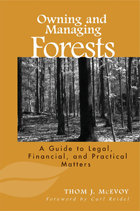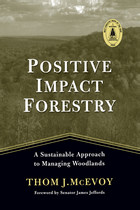
Owning and Managing Forests is both an accessible overview of the privileges, rights, and obligations that accompany forest ownership and a guidebook to help active forest owners and managers use laws to their advantage and avoid the pitfalls of expensive and exhausting litigation. The book is a revised, expanded, and updated edition of Legal Aspects of Owning and Managing Woodlands, published in 1998 by Island Press and named Best Forestry Book of the Year by the National Woodland Owners Association.
This edition provides current information on recent changes in property, environmental, and tax laws, while also discussing new directions in forest management. It offers expanded treatment of topics including private property, searching property records, easements, estate planning, timber sale contracts, working with forestry professionals, and how to pass woodlands intact to future generations. The book also describes the many different facets of trusts, changes in forestland taxation methods, and new licensing and certification options. Included, too, is a section on avoiding disputes and how to use alternative dispute resolution methods to avoid costly, troubling, and time-consuming court battles.
Owning and Managing Forests provides clear and concise descriptions of often confusing concepts and difficult subjects, and addresses issues in a competent yet conversational tone. Anyone involved with owning or managing forestland will find the book an essential guide and reference.

Positive Impact Forestry is a primer for private woodland owners and their managers on managing their land and forests to protect both ecological and economic vitality. Moving beyond the concept of "low impact forestry," Thom McEvoy brings together the latest scientific understanding and insights to describe an approach to managing forests that meets the needs of landowners while at the same time maintaining the integrity of forest ecosystems. "Positive impact forestry" emphasizes forestry's potential to achieve sustainable benefits both now and into the future, with long-term investment superseding short-term gain, and the needs of families—especially future generations—exceeding those of individuals.
Thom McEvoy offers a thorough discussion of silvicultural basics, synthesizing and explaining the current state of forestry science on topics such as forest soils, tree roots, form and function in trees, and the effects of different harvesting methods on trees, soil organisms, and sites. He also offers invaluable advice on financial, legal, and management issues, ranging from finding the right forestry professionals to managing for products other than timber to passing forest lands and management legacies on to future generations.
Positive Impact Forestry helps readers understand the impacts of deliberate human activities on forests and offers viable strategies that provide benefits without damaging ecosystems. It speaks directly to private forest owners and their advisers and represents an innovative guide for anyone concerned with protecting forest ecosystems, timber production, land management, and the long-term health of forests.
Named the "Best Forestry Book for 2004" by the National Woodlands Owners Association.
READERS
Browse our collection.
PUBLISHERS
See BiblioVault's publisher services.
STUDENT SERVICES
Files for college accessibility offices.
UChicago Accessibility Resources
home | accessibility | search | about | contact us
BiblioVault ® 2001 - 2024
The University of Chicago Press









